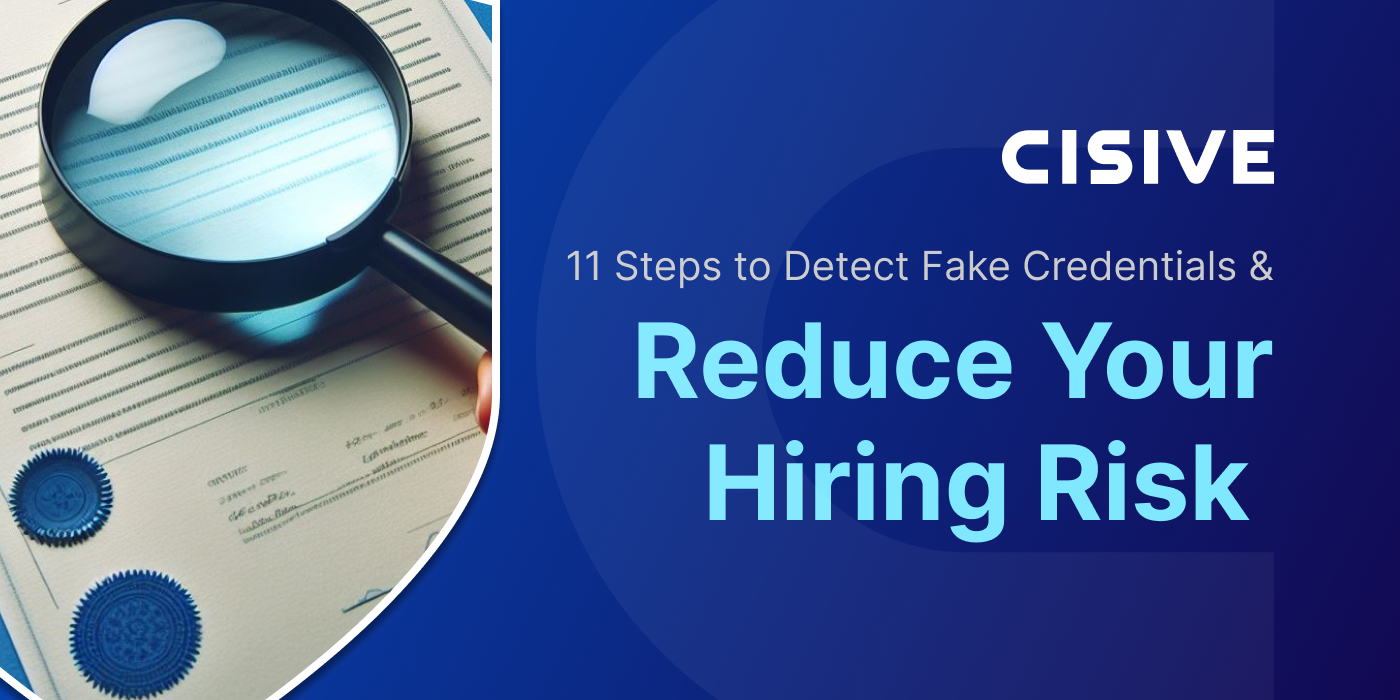

Provider credentialing is essential. Healthcare organizations must have bylaws in place that define...

Job candidates touting fake diplomas and fraudulent credentials pose significant risks to business success and, in some roles, present real risks to public safety. A survey conducted by ResumeLab found that 7 out of 10 workers admitted to lying on their resumes. Of these workers, 11% admitted to lying about their education credentials.
Find out why credential fraud happens, see examples, and learn how to verify job candidates’ academic and medical credentials.
Top six takeaways:
|
Fake qualifications during the hiring process can have the immediate consequence of employing an unqualified candidate. This fraud also has deeper effects — undermining trust and weakening the confidence of employees, customers, and stakeholders in your brand. Worst of all, hiring people with fraudulent credentials, especially for positions requiring specialized knowledge or skills, can lead to substandard work performance and even put lives at risk.
Fraudulent medical credentials can lead to unqualified individuals delivering care, which risks patient safety and undermines public trust in your healthcare facility. In law enforcement, fake qualifications compromise the integrity and effectiveness of policing, potentially endangering public safety and eroding community trust. Fake degrees and other fraudulent credentials in higher education undermine the merit-based system of advancement, devaluing genuine scholarly achievements and diluting the quality of education and research.
The proliferation of fake qualifications in these areas jeopardizes people’s lives and careers while creating ethical, legal, and societal challenges. All of this highlights the critical need for rigorous verification and credentialing processes to combat this growing problem.

Employers, especially those in highly regulated or high-risk industries, must be vigilant against the latest kinds of fraudulent credentials. Here are some key types of fraudulent credentials.
Fake universities, also known as diploma mills, pretend to be legitimate schools and charge money for degrees and diplomas without requiring much academic work. These degrees hold little value in the professional world because they don’t demonstrate genuine academic knowledge, achievements, or skills.
To spot diploma mills, look for indicators including the lack of a physical campus, extremely short programs for complex degrees, and a pay-per-degree model. Regardless of the institution, employers should always verify the accreditation of any educational institution listed on a candidate's resume.
A trusted background screening partner like Cisive can vet candidate credentials. Cisive verifies that educational institutions are accredited by a recognized accreditation body. From there, our background screening experts conduct a check of the applicant’s highest degree achieved — or all of the applicant’s education, from high school on, as specified by the client.
While diploma mills aren’t banned in the U.S., many have been prosecuted on charges of mail fraud or wire fraud.
Another prevalent form of credential fraud is lying about work experiences or references. Some candidates exaggerate their roles and responsibilities in existing organizations to appear more qualified than they truly are. Others go further, listing fake companies or defunct companies where checking on their employment history will be more difficult.
To counter this, employers should conduct thorough background checks, including direct contact with listed references and previous employers. A background screening partner can help with this process. Cisive contacts and interviews references to verify candidate job titles and work experiences.
Additionally, use the interview process to ask candidates deeper questions about their work history and professional background. This line of questioning can be valuable for understanding the candidate’s value — and help uncover inconsistencies or fabrications.
Counterfeit certifications and licenses are a direct attempt to fake professional qualifications, especially in highly regulated fields. This type of fraud is especially dangerous in fields that require certifications for legal or safety reasons, including healthcare, engineering, and finance.
Verification in this context requires direct confirmation with licensing bodies or regulatory agencies to ensure that the certificate or license is genuine and valid. Digital verification tools and niche professional background screening services can be invaluable in this process.
PreCheck’s healthcare background checks, for example, help employers make better hiring decisions, including by detecting fraudulent medical credentials. In addition to background check services, PreCheck’s LicenseManager Pro® software provides ongoing license monitoring, and integrates with national databases, such as the Nursys nurse-licensing verification system.

Employers have many resources available to detect fraudulent credentials in job candidates and employees. From cutting-edge digital verification services to background check agencies, employers can tap outside expertise to verify any candidate’s qualifications.
Employment and education verification helps employers detect fraudulent credentials by confirming candidate-provided information. This involves reaching out to past employers to verify the candidate's employment history, job titles, and other pertinent information. With educational institutions, this verification process examines the legitimacy of a candidate’s claimed academic degrees or certifications.
This process identifies discrepancies or false claims presented on a resume, application, or other interactions. A successful verification ensures that the candidate’s qualifications are accurate and reputable.
Education verification is instrumental in identifying degrees from unaccredited institutions or diploma mills, which potentially signal fraudulent credentials. By verifying that candidates have received their education from accredited institutions, employers reduce the risk of hiring unqualified or unskilled employees.
This vetting process maintains the integrity of the hiring process and protects the organization from legal and reputational consequences.
Digital authentication tools and services have revolutionized how employers detect fraudulent credentials. These tools use advanced technologies such as the blockchain, digital signatures, and secure verification links to ensure that a candidate’s credentials are genuine and issued by legitimate authorities. The Velocity Network Foundation, for example, streamlines the employment verification process with high-quality results.
Digital authentication tools are a secure and tamper-proof method for storing and verifying academic and professional achievements. Using this technology makes it harder for individuals to present fake credentials. This streamlines the verification process and gives employers confidence that they’re hiring qualified people.
Professional background screening providers offer a comprehensive solution for detecting fraudulent credentials. These providers conduct thorough checks on an individual's educational background, employment history, professional licenses, and certifications.
These screening providers have long-standing relationships with educational institutions and employers, along with access to proprietary databases. That allows them to quickly identify discrepancies or fabrications. Their rigorous verification processes are designed to detect fake degrees, doctored documents, or claims of employment at nonexistent companies.
From bogus diplomas issued by nonexistent universities to counterfeit certifications that falsely attest to an individual's skills, these examples of fraud undermine the value of genuine qualifications.
A federal investigation uncovered a fraudulent nursing diploma scheme that involved more than 7,600 fake nursing diplomas issued by three Florida-based nursing schools.
These counterfeit documents enabled individuals to sit for the national nursing board exam by presenting fake diplomas and transcripts. Many of these people became licensed as registered nurses or practical nurses without undergoing the necessary education and training.
This type of widespread fraud casts doubt on medical and education institutions, the nursing profession as a whole, and the perception of public health and safety. Patient care was jeopardized by these individuals being placed in critical healthcare roles across multiple states.
This case serves as a stark reminder of the importance of the vigilance required by healthcare employers to combat such fraudulent activities.
Nearly 10 years ago, The New York Times exposed a massive operation by Axact, a Pakistani company that earned millions of dollars through the sale of fake diplomas from nonexistent universities. The report uncovered how Axact, ostensibly an IT company, constructed an elaborate network of fictitious online schools offering fake diplomas and degrees. The company issued an estimated 8 million fraudulent diplomas.
High-pressure sales tactics and the promise of accredited university degrees convinced many customers to pay large sums of money from fabricated schools with names like Columbiana and Barkley. Allen Ezell, a former FBI agent and an expert on diploma mills, views fake degrees as a significant global issue because of how easily people can purchase illegitimate academic qualifications.
Adopting best practices can help employers identify fraudulent credentials and take appropriate action, including not hiring such candidates. Here are 11 steps you can take to detect fraud and maintain high standards for your workforce.
Employers can ensure they hire only qualified and honest candidates when they follow verification best practices and partner with a trusted background check provider. Every hire is an investment in your company's success and reputation, so make sure they truly have the skills and experience they claim to have.
A trusted background screening partner can make all the difference. These experts are prepared to uncover the truth behind the paperwork, giving you peace of mind and protecting your business from the dangers of fraudulent credentials. In a world where trust is a currency and a cornerstone, having the right team on your side isn't just smart — it's essential.
Author: Cisive Staff
Bio: Contributed by a member of our staff with expertise in background screening for highly regulated industries.
Let's Connect on LinkedIn